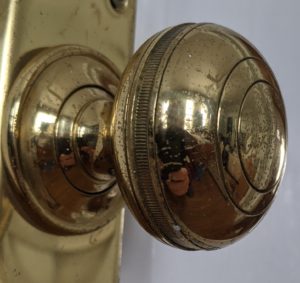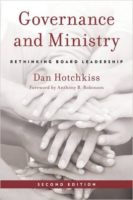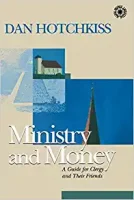
When I was a young seminarian, I worked in a factory that made doorknobs for historic buildings. In class I studied new, improved ideas about faith and life. At the W.C. Vaughan Company—working with Joe, Homer, and Fred—I learned to value what my elders had to teach.
That was more than forty years ago! Today pastors often ask me, “What should I do about the Elders?” They’re talking about the old guard—longtime and former leaders. Different congregations call them Deacons, Past Presidents, the Women’s Fellowship, or something else. Sometimes Elders have no formal name at all—but rest assured, if your congregation has existed for more than a decade, they do exist! Like Joe, Homer, and Fred, they can be challenging, but have a lot to teach.
Elders are the bearers of tradition, and tradition can weigh heavy on the shoulders of new clergy leaders. Elders need to be thanked for what they do and honored for their past achievements. When they feel slighted, Elders can be prickly, which can make it hard to fit them into present-day decision making. But whenever I am tempted to dismiss them as mere relics of the past, I think of Joe.
Brass into doorknobs
Joe was my boss. He stood in his shop apron every day, as he had done since coming home from World War II, hunched over an army-surplus lathe. Starting with a mushroom-shaped brass casting, Joe carved with tools he made from hand files. Slowly, like a face rising from a pond, an ornamented doorknob surfaced out of the rough metal.
Somewhere in the shop were blueprints; Joe never looked at them. It all was in his head—plans for a hundred kinds of doorknobs, solutions to the thousand problems that arise in shop work. I think of Joe when I remember everything a congregation’s Elders have to teach—if you can only get them to articulate it so that newcomers will understand.
Like Elders in a congregation, Joe could be prickly. He remembered the old days, when foundries were ashamed to send out castings like the one I see him holding now: “Look at this—cracks and bubbles everywhere. You waste your time machining it and then you have to throw it out.”
“Now Joe, don’t start on that.” Homer, the locksmith, didn’t like it when Joe started to complain. Homer sat at a bench reproducing and repairing locks. Homer loved old locks, loved figuring out how they worked, imagining the lives of those who used them — almost as much as he loved the baklava that Mrs. Homer baked and packed for him each Monday.
Carrying on the work
Joe and Homer had worked at W.C. Vaughan since the days of W.C. himself. Both were over seventy, and neither had the means or inclination to retire. And so, each day, they climbed to the fourth floor of the Steak and Ale Building to make and restore brass hardware for antique buildings.
Embattled pastors sometimes fail to notice that they needn’t “do something” about the Elders by themselves. Like Joe and Homer, your Elders have been regulating one another for a long time. When Joe got cranky, Homer calmed him—and before long, Joe was back at his machine, happily spinning out more doorknobs. Joe was interested in what he did and never watched the clock. Joe and Homer had the kind of deep connection to their work most of us would like to have, and too few do.
I was self-conscious sometimes around Joe and Homer because of the contrast between my life as a relatively privileged student and theirs as workers in a tiny factory. They knew about class differences, of course. They were both fans of the Atlanta Braves, which seemed a little odd to me, till Joe explained, “When we were a young, it was the Boston Braves. The Red Socks were the Brahmin team, but if a kid went to a Braves game, they gave you carfare home. That’s why guys who grew up poor in Boston still root for the Braves.”
Older ways of thinking
This might be a good time to notice some of the ways Joe and Homer’s world was segregated and unfair. Black kids probably were not included in the Braves’ free carfare offer. Kids with disabilities were probably not expected either, and girls were in a separate class entirely, whose options then did not extend to learning a skilled trade. Noticing such things is one of the important spiritual disciplines of our time. But it need not keep us from appreciating or respecting Elders, even those who have not changed in every way they should.
Compared to current leaders, many Elders have old-fashioned ways of thinking about things like racial differences or sexuality or gender. Conversation on such topics can be frustrating and awkward, especially if the newcomers assume they are the only ones with wisdom. I’m grateful to Joe for reminding me to listen even when I’m pretty sure I know the score.
Joe was Italian, obviously, and Homer was Greek. At coffee breaks they discussed opera, which for them was popular music from the old country. Both had always seen the latest PBS broadcast of La Traviata or The Magic Flute, and they debated the relative merits of the singers with the same passion men in other factories had for baseball. Even Fred, the humble polisher, though he was younger and of English stock, became an opera fan in self-defense.
What remains?
W.C. Vaughan still exists on paper, but so far as I know it no longer manufactures building hardware. My work schedule was too infrequent for me to learn even a fraction of what Joe and Homer had to teach, much less to train the young man who was hired to carry on. So from a business point of view, my work there may count as a failure.
For me, though, if not for the company, my time there was a success. I can’t imagine a more perfect respite from the earnest abstractions of divinity school than to take a hunk of brass and drill, lathe, knurl, and emery-paper it into a bright drawer pull, window latch, or doorknob. Nor can I imagine two more perfect mentors than Joe and Homer. These old-world gentlemen modeled utter concentration in their work, playful connoisseurship in their break-times, and an old-world craftsmanship adaptable to any project: supper dishes, flower gardens, office memoranda, sermons.
What should you do about the Elders? Appreciate them. Thank them. Listen to them. Let them surprise you. When they get prickly, let them take care of one another as they have been doing for a long time.
Dan Hotchkiss has consulted with a wide spectrum of churches, synagogues, and other organizations spanning 33 denominational families. Through his coaching, teaching, and writing, Dan has touched the lives of an even wider range of leaders. His focus is to help organizations engage their constituents in discerning what their mission calls for at a given time, and to empower leaders to act boldly and creatively.
Dan coaches leaders and consults selectively with congregations and other mission-driven groups, mostly by phone and videoconference, from his home near Boston. Prior to consulting independently, Dan served as a Unitarian Universalist parish minister, denominational executive, and senior consultant for the Alban Institute.


